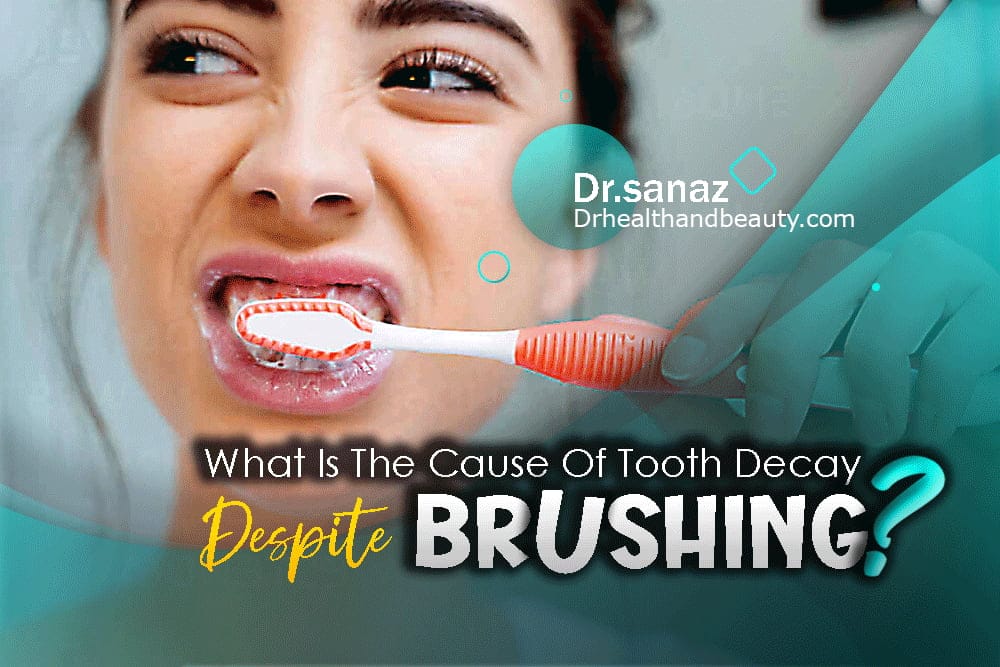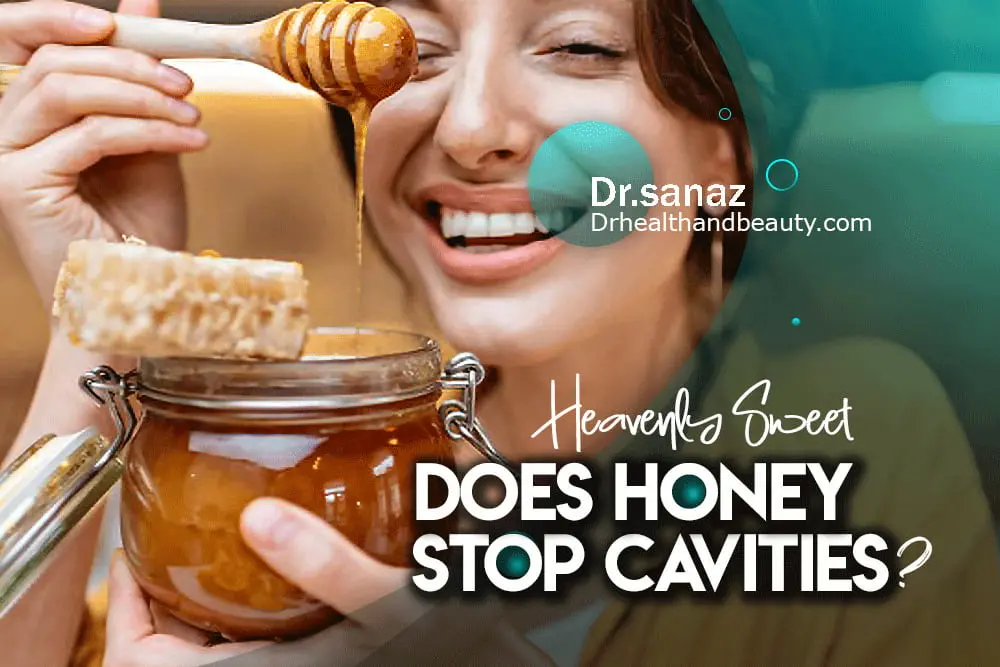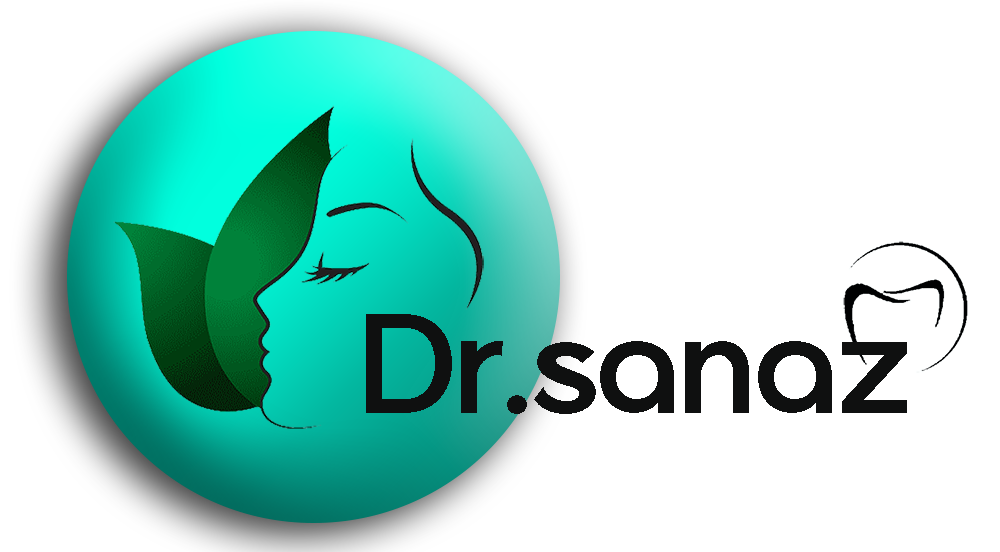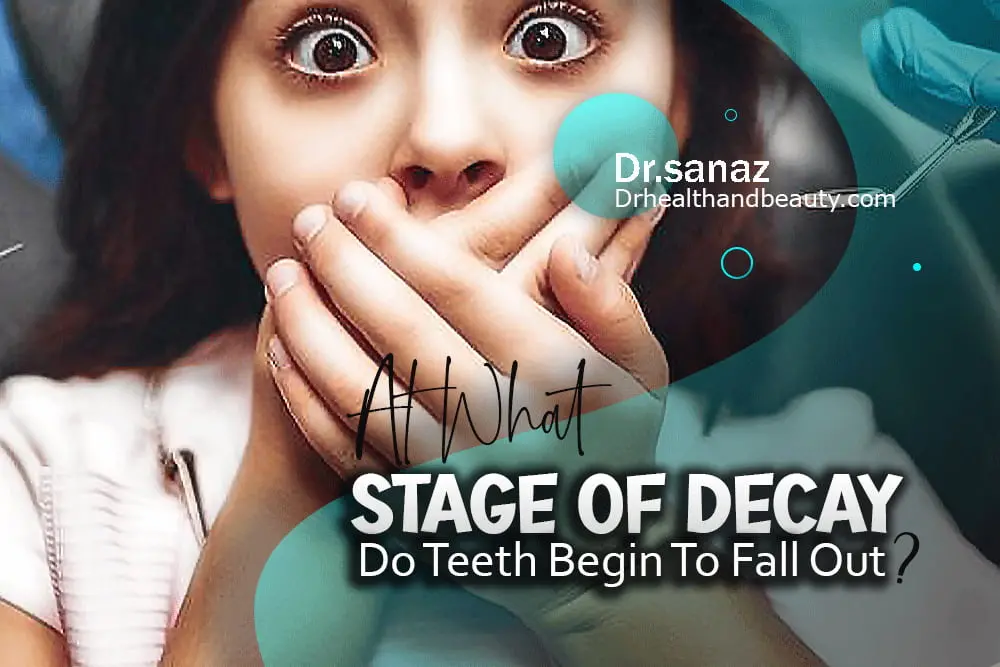

Does Honey Stop Cavities?
The content of this article is approved by “drhealthandbeauty” experts.
Note: This article is only to guide and increase your knowledge. Before taking any action, you can consult “drhealthandbeauty” doctors or your doctor for treatment.
In the field of oral health, the search for natural remedies to fight cavities continues. In the meantime, honey is at the top of researchers’ attention as a sweet substance with many properties.
Honey, a magical and natural healing substance, has been used in the treatment of many diseases for thousands of years. With the scientific advances of the last century, many properties of this sweet and golden food have been scientifically proven.
One of the most important properties of natural honey is strengthening teeth. Because of its properties and internal compounds, honey can have great effects on strengthening tooth enamel. Strengthening teeth with honey helps to reduce the chance of tooth decay and the possibility of tooth breakage because it strengthens the gums.
Of course, it is natural that you should not expect the consumption of honey in the form of food, i.e., when it is eaten in the form of butter, honey, and bread, to have such properties for the teeth. If you want to use the properties of honey to strengthen your teeth, you should eat honey alone or mixed with water.
Table of Contents
How does honey affect dental health?
Honey has a rich combination of natural sugars, enzymes, antioxidants, and antimicrobial properties. These components collectively contribute to its potential dental benefits. Research shows that honey may inhibit the growth of oral bacteria, like streptococcus mutans, which is a major cause of cavities. In addition, the viscosity of honey may create a protective barrier on tooth surfaces, reducing acid erosion and promoting mineral regeneration.
In this section, we will examine the effect of this delicious substance on dental health.
—
Prevent tooth decay with honey.
In several ways, natural honey can help prevent tooth decay. This is why, in many scientific research studies, the best property of honey for teeth is the prevention of caries.
Perhaps the simplest factor that has made researchers talk about the effect of honey to prevent tooth decay is the removal of sugar. Sugar and sugar, which are rich in sucrose, can combine with some kind of bacteria on the teeth and, turn into destructive acids, and cause tooth decay over time.
Replacing honey with sugar helps reduce the risk of tooth decay due to sugar consumption. Modifying the lifestyle in this small case can prevent tooth decay and prevent the occurrence of destructive diseases such as diabetes.
Another reason is the antimicrobial and antibacterial properties of natural honey. As you know, honey is an antibacterial substance that can kill many bacteria known in the world. Also, the consumption of honey can help to eliminate germs on the teeth. All these things will help prevent tooth decay.
If you use natural honey alone or even honey syrup, you can put it in your mouth. In this case, natural honey will perform its bactericidal function well and prevent the occurrence of caries in different teeth.
—
Prevention and removal of dental plaque with natural honey
Perhaps one of the most common oral and dental problems that cause many problems for people is plaque.
Dental plaque, which is a type of complication, is caused by the accumulation of millions of bacteria on the tooth surface. Plaque, which is actually a very thin and sticky layer, can be removed with a toothbrush.
However, you have probably felt such mass on your teeth most mornings. Dental plaque is one of the most important factors that damage the gums and cause tooth wear and tear.
Natural honey has very strong and natural antibacterial properties. Consuming natural honey on a regular basis can help fight dental plaque. Due to the antibacterial property of honey, over time, the possibility of growth and multiplication of these bacteria on the teeth is limited, and it is possible to get rid of them.
Of course, don’t forget that if the dental plaque has turned into tartar, it cannot be easily removed from the tooth, and you should see a dentist.
—
Leave toothache relief to honey.
The important feature of natural honey is that it can help relieve many toothaches. Of course, in some cases, there is a possibility that honey can aggravate toothache. For this reason, it is recommended to use natural honey only with cinnamon or propolis to relieve toothache.
Honey and cinnamon have been used to treat toothache in the past because of their wonderful properties. This combination also reduces gum inflammation, which will help reduce toothache.
To use this combination, you can combine honey and cinnamon in a ratio of 3 to 1 and put a ball of cinnamon and honey on the tooth that hurts. Generally, the pain subsides after 15 minutes. Of course, it is better to do this several times a day.
The combination of honey and propolis is also great for toothache. Due to the excellent properties of propolis, if you eat a combination of honey and propolis extract and do not swallow it quickly and swish it in your mouth, your toothache will subside.
Especially if the amount of propolis present in propolis honey composition is high, it will reduce the toothache very soon due to the temporary sensation of numbness.
When water is combined with honey, one of the enzymes in honey, called glucose oxidase, produces disinfectant substances.
This disinfectant is called hydrogen peroxide, and it is used in many health products related to mouth and teeth. When plaque-producing bacteria come into contact with hydrogen peroxide, they are unable to secrete dextran. Dextran is one of the compounds in dental plaque.
The main reason for the antiseptic property of honey is also the production of hydrogen peroxide.
The results of a study at the University of Waikato, New Zealand, have shown that certain types of natural honey, due to their antimicrobial properties, have the ability to prevent the formation of mass and plaque.
Treatment methods:
Make a paste of cardamom, ginger, and licorice powder with enough honey, and then put it on the surface of the painful tooth. Wash with water after a few minutes.
Mix a teaspoon of cinnamon with 5 teaspoons of honey and apply the resulting paste on the tooth that hurts. Do this 3 times a day to get rid of toothache.
Mix a mixture of propolis and arsenic, red lentils, yarrow, and wild peas with a spoonful of olive oil and put it on the tooth that hurts. It calms the pain and prevents tooth decay.
Treatment of gum infection with honey
To treat abscesses and tooth infections, you can put some honey directly on the site of inflammation and infection. The natural antibiotic substances in honey cause the bacteria that cause the infection to be destroyed.
In a research conducted on the effect of honey in preventing gingivitis and tooth decay in patients undergoing orthodontic treatment, they concluded that honey could be used as an alternative to traditional treatments to prevent tooth decay and gingivitis after orthodontic treatment.
How to use honey for infection?
Many scientists and researchers are producing honey toothpaste and diluted honey compounds as mouthwashes. While these innovations are still in progress, you can check out these honey home remedies for gum and tooth infections:
Wash your mouth with lukewarm water and two teaspoons of honey every morning to treat gum infection
Do this for a few days to get rid of gum bacteria.
Apply a mixture of honey and lemon on the gums to reduce infection and relieve pain if you have it.
Massage honey on the gums every morning for 10 minutes. You will see a significant difference in the health of your gums.
—
Honey in oral cancer
Oral cancer is one of the sixth most common cancers in the world and occurs two to four times more in men than in women. More than 90 percent of oral cancers are caused by squamous cell carcinoma.
Natural honey has special anti-inflammatory and antiseptic properties that reduce the possibility of MRSA infections.
Natural honey is an anti-cancer substance.
Natural honey has been investigated due to its anti-cancer properties on various cultured tumor cells, and its positive effects have been proven.
Studies by other researchers show that natural honey treats inflammation, cell cycle, cell growth, and proliferation and causes the death of cancer cells.
Honey in reducing the effects of oral chemotherapy
Chemotherapy is a very useful tool in the cure of head and neck cancer and can be used after surgery and chemotherapy with low weekly doses.
Natural honey prevents the complication of dry mouth caused by chemotherapy.
Dry mouth caused by gamma radiation is the most controversial side effect of radiation therapy and causes a lot of pain and complications.
Studies show that honey is effective in preventing dry mouth.
In addition, many studies around the world have shown that honey is useful in reducing the incidence of oral mucositis caused by radiation therapy, reducing treatment disorders, reducing weight, and delaying the onset of dry mouth.
—
Honey prevents destruction of salivary glands
Salivary glands are often damaged during head and neck cancer chemotherapy. This damage reduces the volume and quality of the salivary glands of patients and causes dry mouth.
Preliminary studies show that honey is effective in preventing dry mouth caused by chemotherapy. Later, The researchers observed that the pseudo-drugs obtained from honey were effective in reducing dry mouth, boosting the overall quality of life, and reducing pain and difficulty in swallowing 1 and 6 months after the end of the treatment.
—
Teeth whitening with honey
As we know, plaque and tartar are one of the causes of dark and yellow teeth. Consuming honey in the form of mouthwash or brushing with it can prevent the formation of plaque and thus make the teeth whiter.
Properties of honey for children
Honey has a significant effect on the growth and strengthening of children due to the presence of nutrients, minerals, and vitamins. However, experts recommend that it is better not to use honey for babies before the age of two years because there is a possibility of allergy in these young children.
Oral thrush is one of the most common oral problems among children and adults. The development of white and yellow raised spots is one of the symptoms of this disease. Propolis can be used to quickly treat oral thrush in babies and adults.
For this purpose, you can put some propolis on the affected area. Of course, the use of Brahmo is not recommended for children under one-year-old.
—
Does honey really stop cavities?
There is a lot of debate about whether honey is bad for teeth. Some reports show the effect of honey on tooth decay, while others claim that honey is less carious than sugar. It has been mentioned in several studies that due to the antimicrobial activity of natural honey, the consumption of honey decreases the growth of decay-causing bacteria.
While early studies point to honey’s potential to prevent cavities, conclusive evidence is still lacking. The effectiveness of honey as an independent cavity-fighting agent is still debated among dental professionals.
It is important to acknowledge that while honey may offer some protective properties, it should not be considered a replacement for regular oral hygiene practices like regular brushing, flossing, and dental checkups.
So, it should not be overlooked that moderation is key when it comes to honey and cavities. And consuming too much honey can cause tooth decay if oral hygiene is neglected. Therefore, including honey in a balanced diet and maintaining good oral habits is very important for overall dental health.
—
Our comparison between honey and sugar – which is better for teeth?
Unlike refined sugar, honey contains small amounts of minerals and antioxidants that may offer mild protective benefits.
Additionally, honey’s lower glycemic index means a slower release of sugars into the bloodstream, potentially reducing the risk of rapid tooth decay. However, both honey and sugar can cause bacterial growth if consumed in excess, emphasizing the importance of moderation and careful oral care.
Prof. Vaxor Gastov believes that if sugar stays in the mouth for a while, it is broken down by bacteria and creates lactic acid in the mouth, which is harmful to the teeth. But unlike sugar, honey does not produce any acid in the mouth because it has a natural antibiotic and disinfects the teeth.
For this reason, its use for teeth (especially children) is not only harmful but also beneficial.
McLean, an American researcher, believes that tea contains fluorine and is an effective medicine for preventing tooth decay. Provided that it is drunk with natural honey. If tea is drunk with sugar, this property is lost. This is why most Russian scientists, including Raf, recommend sweetening tea with honey instead of sugar.
—
Important points in using honey
Include honey in your oral care routine to prevent cavities
To take advantage of the potential benefits of honey for dental health, consider these practical tips:
- Choose raw, unprocessed honey to maximize its natural properties.
- Use honey as a sweetener in moderation, especially in homemade oral care products such as toothpaste or mouthwash.
- Combine honey with foods that promote saliva production and help wash away food particles and buffer acids.
- Maintain an oral hygiene regimen, including brushing with fluoride toothpaste, daily flossing, and regular visits to the dentist for checkups and cleanings.
Is the consumption of honey useful for tooth extraction?
After dental surgery, you can use honey to prevent possible infections and reduce inflammation caused by surgery. For this purpose, honey can be placed on the surgical site.
.
Is chewing beeswax good for dental health?
Many experts believe that chewing beeswax can prevent tooth decay. But how does using wax prevent tooth decay?
Chewing beeswax is one of the best ways to maintain the health of the mouth and teeth and freshen the oral environment. Chewing wax increases the secretion of saliva. Saliva is a natural cleanser, and the secretion of the right amount of it can permanently wash the teeth and thus prevent the formation of plaque. Of course, it can be said that the treatment of dental plaque with propolis is not 100% possible because the plaque, in many cases, has become very hard and must be removed from the surface of the tooth with special materials.
Also, chewing beeswax, by increasing the secretion of saliva, will maintain the freshness and freshness of the mouth and eliminate bad breath.
Chewing beeswax is a healthy alternative to chewing gum and products containing sugar or other artificial sweeteners.
—
Conclusion
The properties of honey for teeth have made this natural substance to be known as tooth-friendly. Of course, the property of honey for the mouth and gums is also in its place, which, in addition to the mentioned properties for the teeth, makes a unique potion for the health of the mouth and teeth. Maybe it’s better to go for natural ingredients like honey instead of using some chemicals like mouthwash to give more importance to the health of our mouth and teeth.
Currently, in Australia and New Zealand, selected honey is marketed as a high-level controller of antibacterial activity and used in wound healing. Research on the use of honey with high anti-inflammatory properties should also be done so that the maximum use of honey as a therapeutic substance can be achieved.

